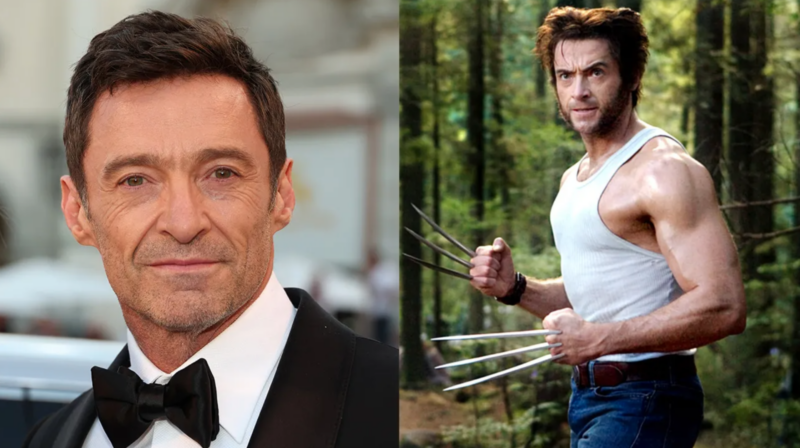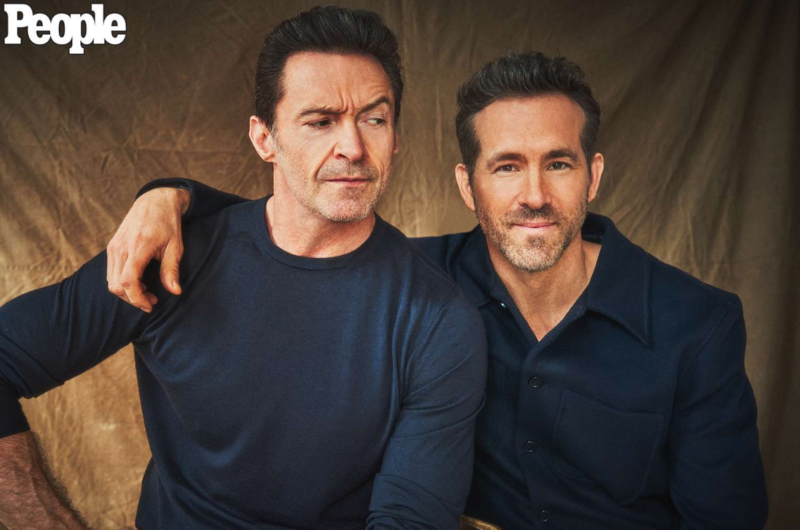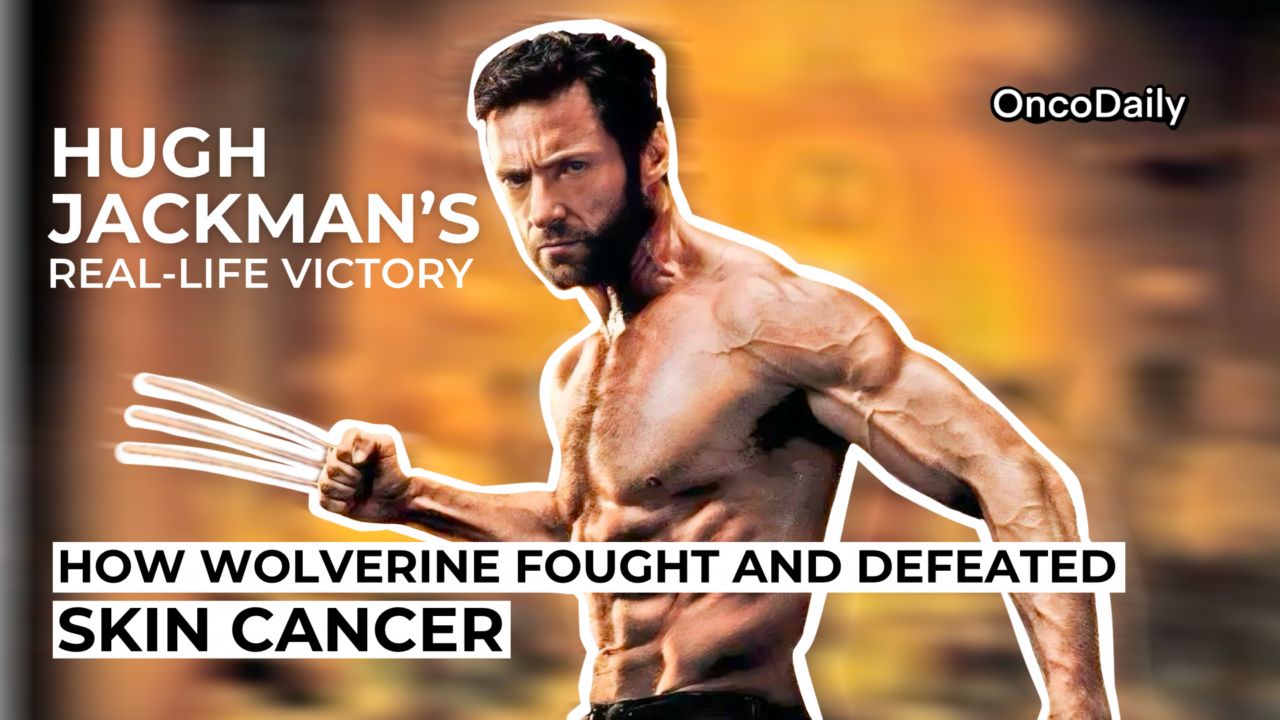
Hugh Jackman and Skin Cancer: How He Went Against, How He Survived, and More
Hugh Jackman is an Australian actor known for his charisma, talent, and versatility. Best known for his role as Wolverine, he has won hearts worldwide with his performances in film and theater. He has faced basal cell carcinoma, a type of skin cancer, multiple times since 2013. His treatments involved surgeries, and he’s been vocal about skin protection. Jackman urges people to wear sunscreen and stay vigilant about skin health. Through early detection and proper care, he continues to live a healthy life.
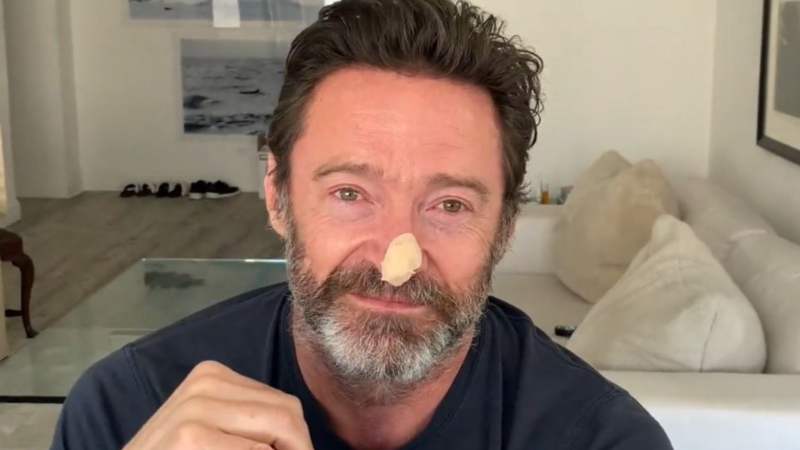 How Did Hugh Jackman Get Diagnosed with Skin Cancer?
How Did Hugh Jackman Get Diagnosed with Skin Cancer?
Hugh Jackman’s skin cancer diagnosis was largely the result of his proactive approach to health, combined with a crucial reminder from his wife. His first basal cell carcinoma (BCC) was discovered in 2013, after his wife, Deborra-Lee Furness, urged him to get a small mark on his nose checked. Jackman had initially thought the mark was nothing serious, but upon visiting a dermatologist, he learned it was skin cancer. This prompted him to prioritize regular skin checks moving forward.
He has since been treated for several recurrences of BCC, a common but potentially dangerous type of skin cancer. Jackman’s case underscores the importance of early detection, as BCCs rarely spread when caught early but can cause significant damage if left untreated. Through his openness, Jackman has used his platform to emphasize the role of regular skin checks, sunscreen use, and early intervention in reducing the risks of skin cancer.
Symptoms
Common symptoms of skin cancer can vary depending on the type, but key signs of basal cell carcinoma to watch for include:
- Appearance:
- Pearly or Waxy Bump: Often shiny with visible blood vessels.
- Flat Lesion: May appear as a reddish patch or a scar-like area.
- Common Locations:
- Sun-Exposed Areas: Face, ears, neck, scalp, shoulders, and back.
- Other Signs:
- Bleeding or Oozing: May develop a sore that doesn’t heal.
- Growth Changes: Slow-growing and rarely spreads to other parts of the body.
What Were Hugh Jackman’s Initial Reactions to His Diagnosis?
When Hugh Jackman was first diagnosed with skin cancer in 2013, he admitted to feeling a mix of shock and fear. In interviews, he has reflected on how initially he didn’t think the mark on his nose was anything serious, but it turned out to be basal cell carcinoma. Jackman has said, “I was a typical man, I ignored it,” expressing regret that he hadn’t taken it seriously earlier. After his diagnosis, Jackman shared his journey with fans on social media, posting images of himself with bandages after treatment and urging followers to wear sunscreen. He emphasized that his diagnosis was “not life-threatening” but still encouraged others to learn from his experience.
His openness helped normalize conversations around skin health and early detection, transforming his fear into an educational mission.
What is the prognosis?
The prognosis for basal cell carcinoma (BCC) is generally very positive, especially when detected early. BCC is the most common type of skin cancer but is also the least aggressive. Here are key statistics regarding its prognosis:
- High Cure Rate: According to the American Academy of Dermatology (AAD) and Cancer Research UK BCC has a cure rate of over 95% when treated promptly. Most cases are successfully treated with surgery or other localized treatments, such as cryotherapy or topical medications.
- Low Risk of Metastasis: BCC rarely spreads to other parts of the body. The risk of metastasis is less than 0.1%, making it much less aggressive than other skin cancers like melanoma. According to Skin Cancer Foundation and studies on skin cancer prognosis(Memorial Sloan Kettering Cancer Center)(MDPI)
- Recurrence Rate: According to National Cancer Institute (NCI) although BCC is curable, it can recur. The recurrence rate is about 30% within 5 years of the initial diagnosis, so regular skin check-ups are important.
What Treatments Did Hugh Jackman Undergo?
The treatments Hugh Jackman underwent, particularly Mohs surgery, are highly significant in treating basal cell carcinoma (BCC) due to their effectiveness and high success rates.
Surgery
- Mohs surgery is considered the gold standard for treating BCC, particularly in sensitive areas like the face. It has a cure rate of 97-99% for primary BCCs and around 94% for recurrent cases. This technique is especially effective because it removes cancerous tissue layer by layer while sparing as much healthy tissue as possible. Each layer is examined microscopically during the procedure, ensuring that all cancer cells are removed.
- Surgical excision, which Jackman also underwent, has a 95-98% cure rate for primary BCC. This is a straightforward method where the tumor and a margin of surrounding healthy tissue are removed to prevent recurrence.
The significance of these treatments lies in their ability to treat BCC effectively with minimal scarring and a low risk of recurrence, especially in cosmetically important areas. Jackman’s consistent use of these treatments highlights the importance of early detection and intervention in preventing more aggressive or invasive treatments later on.
Radiation Therapy
Radiation therapy is used for BCC in certain situations, such as:
- Elderly patients or those who cannot undergo surgery.
- Large or difficult-to-reach tumors (e.g., near the eyes, ears, or nose).
- Cases where BCC has recurred after surgery or has spread locally.
It involves targeting the tumor with controlled doses of radiation to destroy cancer cells while minimizing damage to surrounding tissue
How Did Hugh Jackman Overcome Skin Cancer?
Hugh Jackman’s fight against skin cancer was a personal journey of resilience. After multiple surgeries to remove recurring basal cell carcinomas, he turned his fear into advocacy. Jackman now urges others to protect their skin and value life, emphasizing the importance of early detection and care.
Mental and Emotional Challenges
Hugh Jackman demonstrated significant mental and emotional resilience throughout his skin cancer treatment. Despite undergoing multiple surgeries to remove basal cell carcinoma, he maintained a positive attitude and openly shared his experience with fans. Jackman initially felt fear and shock, but quickly turned these emotions into advocacy, raising awareness about skin cancer prevention. By posting updates, including photos of himself post-surgery, he encouraged followers to prioritize sun protection and regular skin checks. His willingness to confront the disease head-on and share his journey publicly reflected both his emotional strength and his desire to help others through his advocacy.
Support from Family and Friends
Hugh Jackman has openly expressed gratitude for the support he received from his family and friends during his skin cancer treatment. His wife, Deborra-Lee Furness, played a key role in encouraging him to get the suspicious mark on his nose checked, which led to his diagnosis. Jackman has often credited her with potentially saving his life by urging him to take action. Throughout his journey, Furness remained by his side, offering emotional support and helping him stay proactive about his health.
Hugh Jackman has received significant support from friends and colleagues during his recent health challenges. After announcing that he is undergoing treatment for skin cancer, many in the entertainment industry have rallied around him.
Ryan Reynolds, a close friend and frequent collaborator, publicly expressed his concern and support, emphasizing the importance of Hugh’s health and well-being. Fellow actors and friends, including Nicole Kidman and Kate Hudson, have also shared messages of encouragement, highlighting Jackman’s strength and resilience.
How Did Advocacy and Public Awareness Help?
Hugh Jackman has effectively utilized his public platform to raise awareness about skin cancer, particularly basal cell carcinoma (BCC), and to promote the importance of sun protection. His advocacy is notable for its impact on public interest and awareness.
Collaborations with Health Organizations
Jackman has partnered with leading skin cancer organizations, such as the Melanoma Research Foundation and the Skin Cancer Foundation, to raise awareness about the importance of sun protection and early detection. Through these collaborations, he has participated in public service announcements, educational campaigns, and awareness events that have reached millions of people worldwide.
Public Speaking and Advocacy
The “Hugh Jackman Effect” highlights the profound influence that a celebrity can have on public health awareness and behavior. By sharing his experiences and advocating for sun safety, Jackman has played a crucial role in educating the public about skin cancer prevention, ultimately encouraging individuals to take proactive steps in protecting their skin health.
What Is Hugh Jackman’s Life Like After Skin Cancer?
After undergoing multiple treatments for skin cancer, particularly basal cell carcinoma (BCC), Hugh Jackman has remained committed to advocating for skin health and managing his ongoing challenges. Despite the setbacks, he has continued to thrive in his acting career while prioritizing his well-being.
Ongoing Health Challenges
Jackman continues to manage the challenges associated with his skin cancer diagnosis. He regularly undergoes skin checks and is proactive about addressing any new concerns. Despite the inconvenience and potential discomfort, Jackman remains committed to prioritizing his health and setting an example for others to do the same.
Continued Advocacy Work
Hugh Jackman, a skin cancer survivor, actively promotes sun safety and skin cancer awareness. He frequently shares reminders on social media about using sunscreen and getting regular skin checks. Through interviews and public appearances, he continues to stress the importance of protecting against UV rays.
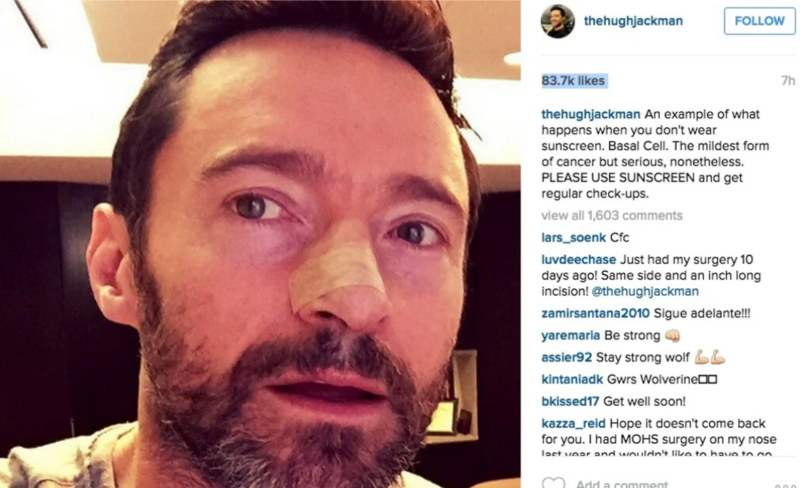
What Causes Skin Cancer?
Genetics significantly influences the risk of developing skin cancer through familial risk factors and specific genetic predispositions.
Genetic Factors
- CDKN2A Gene Mutations: Individuals with mutations in the CDKN2A gene have a 30%-70% lifetime risk of developing melanoma.
- Familial Melanoma: CDKN2A mutations account for 20%-40% of familial melanoma cases, indicating a significant hereditary component.
- Pancreatic Cancer Risk: Carriers of CDKN2A mutations also face a 5%-24% lifetime risk of developing pancreatic cancer.
- Melanoma Incidence: Studies suggest that individuals with CDKN2A mutations may have a higher incidence of melanoma and a worse prognosis, with a hazard ratio of 1.30 for overall survival.
UV Exposure and Lifestyle Factors
1. Ultraviolet (UV) Radiation Exposure: Sun Exposure: Individuals with a history of five or more sunburns increase their risk of melanoma by 80%. Tanning Beds: Using tanning beds before age 35 increases the risk of melanoma by 75%.According to the World Health Organization (WHO)
-
Skin Type: Fair-skinned individuals are at a higher risk. Those with red or blond hair have a 2-4 times greater risk of developing melanoma compared to those with darker hair. According to the American Cancer Society (ACS)
- Age: The incidence of melanoma rises sharply after age 50, with the majority of cases occurring in individuals over 65. According to Centers for Disease Control and Prevention (CDC)
-
Previous Skin Cancer: Individuals with a history of skin cancer are at a 9 times higher risk of developing melanoma again.Skin Cancer Foundation
-
Weakened Immune System: Immunosuppressed individuals have a 2-3 times higher risk of developing non-melanoma skin cancers.
Regular Skin Checks
Preventive measures against skin cancer include regular skin checks, sun protection, and lifestyle changes, as recommended by dermatologists and cancer research organizations like the American Academy of Dermatology (AAD) and the Skin Cancer Foundation.Regular dermatological check-ups vital for early skin cancer detection, with melanoma survival rates reaching 99% when caught early. Monthly self-exams help you spot changes like irregular moles, new spots, or growths. Recognizing these signs early can lead to quicker treatment and better outcomes.
To reduce the risk of skin cancer, consider these lifestyle changes:
- Use High-SPF Sunscreen: Apply broad-spectrum sunscreen with SPF 30+ daily, and reapply every two hours.
- Wear Protective Clothing: Opt for long sleeves, wide-brimmed hats, and UV-protective sunglasses.
- Avoid Peak Sun Hours: Limit sun exposure between 10 a.m. and 4 p.m. when UV rays are strongest.
Sun Protection Tips
Protecting your skin from UV rays is crucial for reducing skin cancer risk. Here are some evidence-based tips to ensure effective sun protection:
- Sunscreen: Use a broad-spectrum sunscreen with SPF 30 or higher. Daily use can reduce the risk of skin cancer by up to 50%, and reapplying every two hours maintains its effectiveness. Don’t forget to reapply after swimming or sweating.
- Dress the Part: Wear UV-protective clothing, including long sleeves, wide-brimmed hats, and UV-blocking sunglasses. Clothing with an Ultraviolet Protection Factor (UPF) rating of 50 can block approximately 98% of UV radiation.
- Seek Shade: Reduce direct sun exposure by seeking shade, especially between 10 a.m. and 4 p.m. During these peak hours, UV radiation is strongest and can increase your risk of skin damage and cancer.
Dietary Recommendations
- Fruits and Vegetables: Eat antioxidant-rich options like berries and citrus fruits. These can lower skin cancer risk by providing vitamins C and E.
- Leafy Greens: Spinach and kale are high in beta-carotene, linked to reduced skin cancer risk.
- Nuts and Seeds: Almonds and sunflower seeds provide vitamin E, which protects skin cells from damage.
- Tomatoes: High in lycopene, which helps protect against UV damage.
- Green Tea: Contains polyphenols that may reduce skin cancer risk.
Incorporating these foods can support skin health and help lower skin cancer risk, as supported by research from sources like the American Institute for Cancer Research.
Return to Acting and Balancing Career with Health
Despite the challenges, Jackman has successfully returned to his acting career, demonstrating his resilience and dedication. He has continued to take on demanding roles while ensuring that his health remains a top priority. Jackman’s ability to balance his career with his health commitments serves as an inspiration to others facing similar challenges.
Hugh Jackman returned as Wolverine in Deadpool 3, joining Ryan Reynolds’ Deadpool in the Marvel Cinematic Universe. The film was released in July 2024.

FAQs
What type of skin cancer did Hugh Jackman have?
Hugh Jackman was diagnosed with basal cell carcinoma, a common form of skin cancer that typically appears on sun-exposed areas of the skin. It’s usually slow-growing and rarely spreads but can cause serious damage if left untreated.
How many times has Hugh Jackman been treated for skin cancer?
Hugh Jackman has been treated for basal cell carcinoma (BCC) multiple times since his first diagnosis in 2013. He has undergone several surgeries to remove cancerous lesions, mostly on his nose.
How did Hugh Jackman first find out he had skin cancer?
Hugh Jackman discovered his first skin cancer in 2013 after his wife, Deborra-Lee Furness, encouraged him to get a small spot on his nose checked by a dermatologist. It was diagnosed as basal cell carcinoma.
Did Hugh Jackman have melanoma?
No, Hugh Jackman has not been diagnosed with melanoma. He has had basal cell carcinoma, which is a different, less aggressive form of skin cancer. Melanoma is more likely to spread, while BCC is typically localized.
Has Hugh Jackman won an Oscar?
No, Hugh Jackman has not won an Academy Award. He has been nominated for an Oscar, including a nomination for Best Actor for his role in “Les Misérables” (2012).
What are Hugh Jackman’s most famous roles?
Hugh Jackman is well-known for his portrayal of Wolverine in the “X-Men” series and his role as Jean Valjean in “Les Misérables.” He has also gained acclaim for his performances in “The Greatest Showman” and “The Prestige.”
What is basal cell carcinoma (BCC)?
Basal cell carcinoma (BCC) is the most common form of skin cancer. It arises from basal cells in the skin’s outer layer and often appears in sun-exposed areas, such as the face. BCC grows slowly and rarely spreads, but it can cause significant damage if untreated.
How is basal cell carcinoma different from melanoma?
Basal cell carcinoma (BCC) is generally less aggressive than melanoma. While BCC tends to stay localized and is less likely to spread, melanoma can metastasize to other parts of the body and is potentially life-threatening if not treated early.
Why is sunscreen important for preventing skin cancer?
Sunscreen protects your skin from harmful ultraviolet (UV) rays, which can cause DNA damage that leads to skin cancer. Regular use of broad-spectrum sunscreen with an SPF of 30 or higher can significantly reduce your risk of developing skin cancer, including basal cell carcinoma.
How often should you get skin checks for early cancer detection?
Dermatologists recommend getting a full-body skin check once a year, or more frequently if you are at high risk for skin cancer. Self-examinations every month are also important to detect any unusual changes or new growths early.
Can people with darker skin get basal cell carcinoma?
Yes, people with darker skin can develop basal cell carcinoma, though the risk is lower than in those with fair skin. Regardless of skin type, everyone should take precautions to protect themselves from UV exposure and regularly check for suspicious growths.
What are the long-term effects of untreated basal cell carcinoma?
Untreated basal cell carcinoma can grow deep into the skin and surrounding tissues, leading to disfigurement or even functional damage in affected areas. In rare cases, it may spread to other parts of the body, although this is uncommon.
How does Mohs surgery work for treating skin cancer?
Mohs surgery is a precise surgical technique used to treat basal cell carcinoma and other skin cancers. It involves removing thin layers of cancerous tissue and examining each layer under a microscope until no cancerous cells remain, preserving as much healthy tissue as possible.
Are certain areas of the body more prone to basal cell carcinoma?
Yes, areas frequently exposed to the sun—such as the face, neck, scalp, ears, and hands—are more prone to developing basal cell carcinoma. Protecting these areas with sunscreen, hats, and clothing can help reduce the risk.
What lifestyle changes can reduce the risk of skin cancer recurrence?
To reduce the risk of skin cancer recurrence, individuals should limit sun exposure, use sunscreen daily, avoid tanning beds, wear protective clothing, and conduct regular skin checks. Staying vigilant after an initial diagnosis is crucial, as skin cancer can recur.
What should you do if you notice a suspicious mark on your skin?
If you notice a suspicious mark or growth on your skin that doesn’t heal, changes shape, or bleeds, you should consult a dermatologist immediately. Early detection is key to successfully treating skin cancer, including basal cell carcinoma.
Written by Aharon Tsaturyan, MD
-
Challenging the Status Quo in Colorectal Cancer 2024
December 6-8, 2024
-
ESMO 2024 Congress
September 13-17, 2024
-
ASCO Annual Meeting
May 30 - June 4, 2024
-
Yvonne Award 2024
May 31, 2024
-
OncoThon 2024, Online
Feb. 15, 2024
-
Global Summit on War & Cancer 2023, Online
Dec. 14-16, 2023

